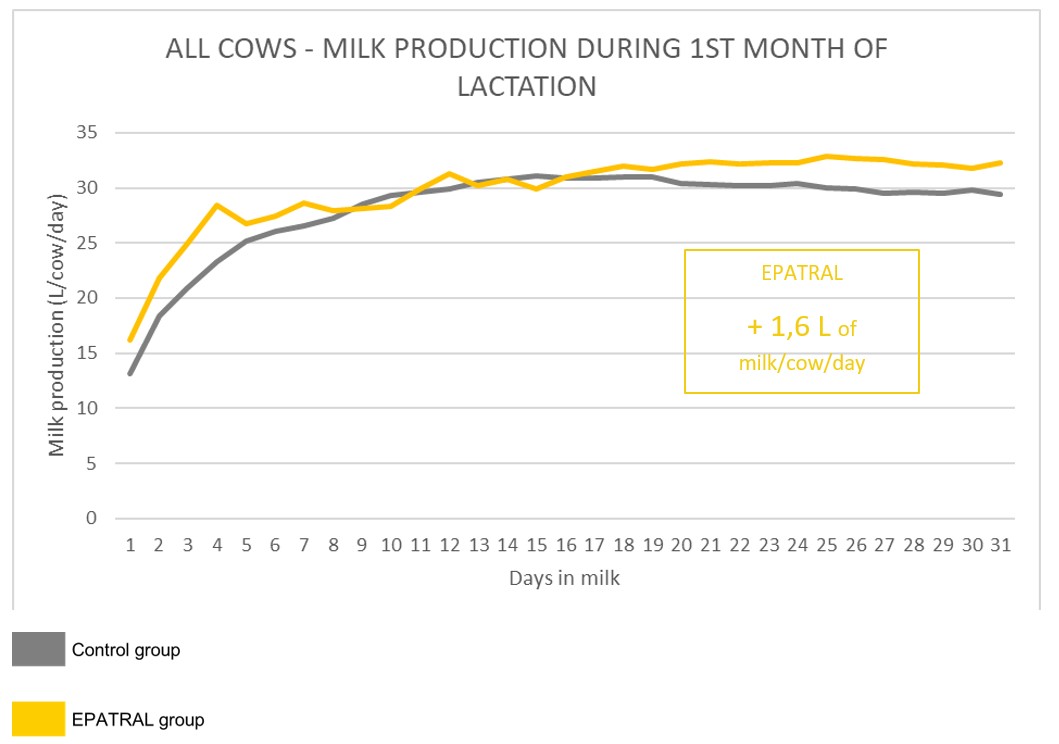Picture yourself driving a formula 1 at maximum speed. All lights are green…and suddenly…black out. What is the diagnosis? Just a clogged car filter. Now, imagine this scenario in the case of animal production: The filter maps to the animal liver, a central metabolic organ.
Did you know that 400L of blood are necessary to produce 1L of milk? Also, that the liver and pancreas produce about 9L of bile per day, in order to digest the feed in the intestines? And that all toxins and metabolic waste are eliminated through the liver?
If the detoxification process does not function properly, toxic substances will accumulate in the liver; this build-up can hamper the other activities including digestion, energy metabolism.
From pasture to winter diet…
The liver is considerably affected in cases of dietary imbalance or swift feed transitions. In the short term, this reflects through low intake, reduction in performance and depressed animals. In the long term, such shocks for the liver lead to accumulation of toxic substances that can hinder efficient liver function, or even block it.
Last autumn, a trial was carried on 96 cows from a dairy farm in Co. Meath. Prior to the trial, the cows were buffer fed at grass. They started their transition to the winter housing and total mixed ration (TMR) on October 30, and were supplemented with the feed speciality EPATRAL from November 12-17 (50mL/cow/day during six days).
The farmer was satisfied just by looking at his cows: They were eating more after the treatment; they gained body condition but also appeared more alert and healthier with shiny coats.
The milking robot told its own story: After a huge drop of milk production due to the feed and environment transition, the cows recovered quickly and instead of seeing their lactation curve continue to fall, they increased their production by 1.8L/cow/day (average from the month following the supplementation).
From dry to milking cow in 24 hours
During early lactation, cows face a huge challenge: The expectation to produce a considerable amount of milk within a very short period of time. A high potential cow’s milk yield averages 35 to 40kg a day. However, in this high-stress period, the diet is not sufficient to cover all its needs.
To take on this challenge, the animal must draw upon its own body reserves. If the demand is too high, its liver can become engorged with fatty acids. Ketosis is a likely outcome. What are the consequences?
The liver cannot completely fulfill its detoxification function anymore; therefore, the overall dairy production is likely to be compromised.
To show the positive effect of cleansing the liver postpartum, another trial was conducted during spring 2020 in Co. Louth from February 4 to April 9. The milk production of 203 cows was followed during their first month of lactation, one group receiving EPATRAL and the other group didn’t.
The difference between these two groups of cows: An average increase of 1.6L of milk per cow per day for the ones that received EPATRAL (from 28.2L to 29.8L per cow per day).
Can plant-based products truly affect liver activity?
To prove the direct effect of the product on liver functions, a research trial has been conducted in France where the product is produced.
About 360 cows from five different herds were separated in two identical groups regarding parity, stage of lactation and previous milk performance. Cows were submitted to blood sampling at the beginning of the trial and after 11 days.
Specific indicators of liver activity were investigated:
- Albumin is a transportation protein and reflects general liver activity: The level of albumin increased twice as much in the EPATRAL group compared to the control group. A D+11, there was a significant higher level of albumin in the EPATRAL group: 35.1g/L versus 32.6g/L (p<0.05);
- Bilirubin is the indicator of bile production and therefore the capacity of the cow to digest the diet: It increased by 14% in the EPATRAL group (10.4 versus 9.1 UI in control group, NS);
- Ketones, a metabolic waste toxic for the cows were measured to evaluate detoxification function: The average level of ketones was reduced in the EPATRAL group at D+11 and moreover there were no cows in acetonemia, compared to 5% in control group (p=0,06);
- Gamma-GT protein is used as a diagnostic marker for liver disease. Elevations in Gamma-GT are indicating liver distress. These were lower in the EPATRAL group (21.9 IU versus 22.5 UI for control group, NS).
These measures demonstrate that this feed speciality is acting very positively on liver, and give an explanation to the consistent increase in milk production that was also seen in this trial.
EPATRAL is based on two plants: Artichoke and Curcuma.
These are recognised by the World Health Organization (WHO) and EU health organisations for their effects on liver draining, digestion stimulation (through bile) but also immunity: Antioxidant and inflammatory modulation.
With this science demonstration but mostly thanks to actual proof with Irish cows, EPATRAL is now a must-have to prepare the upcoming winter transition and to think about for your spring calvings.
The product is distributed by the company Precision Nutrition, specialised in getting the best from plants and animals using natures’ features. Encouraged by the increased intake on dairy cows, the specialists from Precision Nutrition have now started trials on beef units in North Co. Dublin.
Further information
For more information, contact Gerry Bell on mobile: 086-025-6851; or office: (+353) 041-687-1917; or email: [email protected].
For England and Northern Ireland, contact Martin Daly on mobile: 087-753-7228; or at Techna Ireland Nutrition, Cavan Enterprise Park, Dublin Rd, Cavan (H12 YP60).
Alternatively, for the midlands, contact Noel Walsh on mobile: 087-7505-277; or office: 057-875-5390; or at Advance Nutrition, Ballyfin, Co. Laois; or online at: www.advancenutrition.ie.





